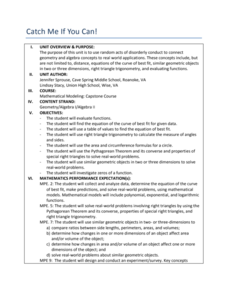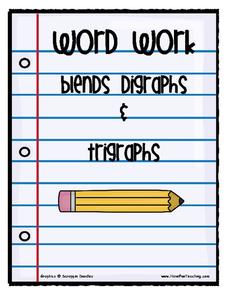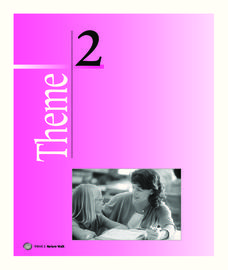K5 Learning
Musical Instruments to Play
Bring some music to your language arts lesson with a reading comprehension activity. Learners read an informational passage about different musical instruments before answering a series of comprehension and vocabulary questions.
ReadWriteThink
Compare and Contrast
Read about the ways that different cultures set up homes with a set of reading activities. Learners read short paragraphs that cover one or more different ideas, and answer four questions about what they have read, including whether or...
Mascil Project
Parachute Food Drop
Drop a perfect project into your lesson plans. Groups use different building materials to create models of parachutes for food drops. After testing out their prototypes, they make improvements to their designs.
Serendip
Soap Opera Genetics – Genetics to Resolve Family Arguments
Did she cheat on her husband? Did the hospital switch the babies? Should they have children? As much as this sounds like the plot for a soap opera, all of these questions fit into a single lesson on genetics. Scholars read about three...
Radford University
Catch Me If You Can!
Crime doesn't pay, but everyone can learn from it. Learners consider different situations involving mischief at a school, such as stink bombs and rockets, and analyze them using mathematics. They must apply trigonometry, quadratic...
University of Colorado
Phases of Charon
Pluto, although no longer considered a planet, has five moons. Pluto's moon, Charon, is the focus of a resource that describes how the moon is viewed from the surface of Pluto. Photos help individuals see how Charon would look at...
Nuffield Foundation
Making a Calibration Curve for Starch Concentration
How well can your class concentrate on solutions? Scholars use colorimeter absorption to explore a starch concentration calibration curve. They add iodine to different starch solutions to see how the concentration of the solution changes.
The Alamo
Lorenzo de Zavala and José Antonio Navarro: Their Contributions to the Independence of Texas
Lorenzo de Zavala and José Antonio Navarro were both native Mexicans and leaders of the Texas Revolution, but with different backgrounds and careers. Compare and contrast the two influential men with a research assignment in which...
American Museum of Natural History
What's This? Staying Safe
Amaze the class with the creative adaptations species employ to trick predators. An online interactive lesson introduces learners to six different species with unique adaptations. Each species highlights a different adaptation and its...
Have Fun Teaching
Word Work: Blends, Digraphs & Trigraphs
Practice thirty-three different consonant blends, digraphs, and trigraphs with your emergent readers! Each letter combination has its own column in which you and your learners can write down five different words that demonstrate the...
Curriculum Corner
Coniferous and Deciduous Trees
What are the differences between coniferous and deciduous trees? Supplement your tree lessons with a set of activities that has learners describing, naming, comparing, and reading about deciduous and coniferous trees. The activities are...
Serendip
Evolution of Fur Color in Mice – Mutation, Environment and Natural Selection
Most species of animals include a variety of fur or hair color, but why? Scholars watch a video about a changing environment for mice. As the rocks around them change hues, different colors of mice begin to thrive. Discussion questions...
Facing History and Ourselves
Responding to Difference
James Berry's poem, "What Do We Do With a Difference?" launches a instructional activity that asks class members to consider the ways people respond when they encounter someone different from themselves. After analyzing the poem and...
Curated OER
The Little Engine that Could Mini Unit Plan
The best part about teaching little ones is setting up fun, thematic learning stations. Here is a full day of activities that all relate to the story, The Little Engine that Could. Included are six different activities that cover...
Curated OER
Mathematics Activities from Diverse Cultures
Connect probability and odds with different games from around the world. Pick from games like Dreidel, Mancala, and a Navajo stick game called Ashbil. All 12 games include probability questions to encourage a discussion before or after...
EngageNY
How Do Dilations Map Lines, Rays, and Circles?
Applying a learned technique to a new type of problem is an important skill in mathematics. The lesson asks scholars to apply their understanding to analyze dilations of different figures. They make conjectures and conclusions to...
Kenan Fellows
Using Water Chemistry as an Indicator of Stream Health
Will this water source support life? Small groups test the chemistry of the water drawn from two different sources. They then compare the collected data to acceptable levels to draw conclusions about the health of the source. The...
Houghton Mifflin Harcourt
Nature Walk: Extra Support Lessons (Theme 2)
Reinforce concepts such as long vowels, spelling patterns, sound clusters, double-final consonants, and syllables with a nature-themed unit. Through a series of extra support lessons, learners compare and contrast using a...
University of Colorado
Patterns and Fingerprints
Human fingerprint patterns are the result of layers of skin growing at different paces, thus causing the layers to pull on each other forming ridges. Here, groups of learners see how patterns and fingerprints assist scientists in a...
Skyscraper Museum
Building a Skyscraper
Creating buildings that reach hundreds of feet into the sky is no easy task. The third instructional activity in this series begins with four activities that engage young architects in exploring the major challenges that are faced when...
Illustrative Mathematics
Walk-a-thon 2
During a walk-a-thon your learners must determine the walking rate of Julianna's progress. Using tables, graphs, and an equation, they must be able to calculate the time it took her to walk one mile and predict her distance based on the...
Mathematics Assessment Project
Matching Situations, Graphs and Linear Equations
What do guitars, candles, and helicopters have in common? They're all in this resource. Learners complete an assessment task to determine the amount of profit made in a guitar class based on given information regarding variable...
5280 Math
More or Less the Same
Tell the story of the math. Given a graph of a linear system, learners write a story that models the graph before crafting the corresponding functions. Graphs intersect at an estimated point, allowing for different variations in the...
Las Cumbres Observatory
The Cosmic Distance Ladder: Parallax
Scientists don't have a ruler long enough to measure to the stars, so they rely on math. Scholars learn to calculate the distance from Earth to a star using the parallax method. They use angle measures from different perspectives to...























